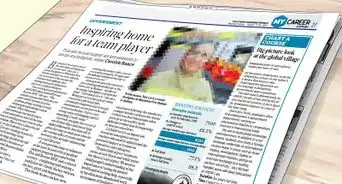This article was co-authored by wikiHow Staff. Our trained team of editors and researchers validate articles for accuracy and comprehensiveness. wikiHow's Content Management Team carefully monitors the work from our editorial staff to ensure that each article is backed by trusted research and meets our high quality standards.
There are 7 references cited in this article, which can be found at the bottom of the page.
This article has been viewed 25,599 times.
Learn more...
Teaching at a community college can be a great choice for academics or industry professionals who want to help grow the next generation in their field. Finding a teaching position at a community college isn’t as simple as applying, though. You need an advanced degree, teaching experience, and a glowing interview to get the job. Most importantly, you need to be passionate about teaching, not just settling until you get a research job. Community colleges put teaching first, and they expect the same from anyone they hire.
Steps
Qualifying to Teach
-
1Get an advanced degree in the field you want to teach. Most community colleges require at least a Master’s level degree in a subject before you can get a job as an instructor. Before you start the application process, you need to have your Master’s in-hand in a subject relevant to the one you want to teach.
- A relevant degree should be a degree in the same field as or a field closely adjacent to the subject you intend to teach. For example, if you have a degree in archaeology, you may be fit to teach in either anthropology or history departments. You likely won't be considered for a teaching position in the business school, though.
- An increased rate of people pursuing advanced degrees means that an increased number of PhDs are now working at the community college level. If you just have your Master’s, understand that you may start out with a single class or a part-time appointment.
- If you are planning on teaching part-time while pursuing your PhD, you will generally have to be in the candidacy portion of your doctorate, rather than the student portion.
-
2Demonstrate your teaching experience. Most community colleges prefer to hire instructors that have teaching experience as well as a degree. As you apply, you will need to prove that you have teaching experience relevant to your subject. This proof could come in the form of student reviews, syllabi from past courses, and/or lesson plans.[1]
- If you are in the process of getting your degree, ask about applying for a teacher’s aid (TA) position to get teaching experience. TAs often lead sections or groups in a larger course.
- Tutoring, developing and leading training programs at an office, or peer mentoring can also serve as relevant points for teaching experience on a resume.
Advertisement -
3Consider getting a community college teaching certificate. If you don’t have a lot of teaching experience, getting a community college teaching certificate may help. These are not regulatory certifications, so they are not required for community colleges. Rather, they are graduate-level certificates that provide graduate students with a background in educational theory and classroom practices.[2]
- Many universities offer these certificates through their educational colleges. You can often take the courses as part of your credit package.
- If you are already out of school, there are a number of these courses available online through different universities’ continuing education programs.
Finding a Position
-
1Establish your presence in your intended department. Spending time working with people in your intended department increases the chances that you will both hear about and be considered for a position. Ask the department chair if you can meet with them and set up a time to observe some classes. Let them know that you want see their teaching style first-hand.[3]
- If you don't have time to observe classes, think about other ways you can make connections. Offer internships for community college students at your workplace, for example. This allows you to coordinate with your department and network before you apply for a job.
- If you are currently getting your degree, think about taking on a student research assistant for a project. This gives you a chance to work with your local community college and build your mentorship skills.
-
2Pick up a class. Even if you have TA experience, offering to pick up a single course or teach a continuing education class can be valuable. Contact the community colleges in which you are interested to see if they have a single class available in your desired department. If no opportunities in your department are available, ask about continuing education courses.[4]
- These jobs are typically low pay, but they allow you to demonstrate your teaching skills to the college at which you want to teach. You can also get a feel for the larger class sizes and diverse student populations at a community college.
- Teaching experience is particularly critical for community colleges. In a university, professors generally teach 2-3 classes a term and are expected to do a certain amount of research. In a community college, you can expect to teach around 5 classes a term with little to no billable research hours.
-
3Search online for a community college position. Most full-time community college positions are advertised nationally on career websites such as Higheredjobs.com and the Chronicle of Higher Education. Colleges will also advertise full-time and part-time positions on their own websites, as well as through different scholarship and research societies.[5]
- If you don’t see any positions listed in your field with the colleges at which you want to teach, reach out to the department head. They can let you know if they are expecting a vacancy any time soon.
Applying for a Position
-
1Read the job description carefully. The exact application materials you will need will vary depending on your field and the specific college requirements. Your application for a community college will generally be different from that of a university job, as a community college will want to know more about your teaching than your research. Read the job description carefully to make sure you include everything required for the position.[6]
- Pay particular attention to wording as you go through the required materials. If a post asks for a resume, send a 1-2 page resume, not your whole academic CV. If a post asks for your CV, don’t just give them a 1 page resume.
- If materials are listed as optional, include them if you can. For example, if syllabi from previous courses are listed as optional, try to include at least one. If, however, the materials are not requested, do not include them with your application.
-
2Prepare your materials and submit your application. Once you know what you need to include in your application packet, follow the application instructions to submit your materials. Be sure to tailor your resume so that is highlights relevant teaching experience, instead of emphasizing only academic or industry research.[7]
- Use your cover letter as a means to show enthusiasm for teaching in your field. This is the place to explain why you specifically want to work in a community college. For example, you could say, "After I spent a year Teaching for an introductory biology course, I found an honest passion for helping students discover their own interest in science."
- Often, this will involve creating an online profile that includes your personal information as well as your previous work and educational experience. Once you’ve filled out the profile, you will be able to upload your materials as supporting documents.
-
3Prepare for the interview. Your community college interview will generally consist of at least two parts. The first will be a committee interview where you sit down with other instructors from the college and answer questions. The second will be a teaching demonstration to prove your competency in the classroom. Prepare your materials for both beforehand so that you are ready to go the day of the interview.[8]
- Be sure to research the college extensively before your interview. Look up your panel members and read through their course materials, as well as any publications they have.
- For your committee interview, be prepared to give clear, concise answers about your experience and why you want to teach at a community college.
- For your teaching demonstration, ask well in advance if you will be assigned a topic or if you must choose your own. Make sure you know the time frame for the demo, as well.
-
4Meet with your interviewing committee. During your interview, you will generally have several questions you need to answer and a limited amount of time to do so. Be prepared to answer questions about your experience with underprepared students, diverse populations, and classroom management.[9]
- Your committee will likely be around 5 people, and may contain 1-2 administrators or instructors from outside your department. Try to avoid too much jargon if people from outside your field are sitting in.
- This process will likely seem rehearsed because your committee members had to clear all questions with HR, and ask the same questions to every candidate. Don’t take their lack of enthusiasm for the process as a lack of enthusiasm for you.
-
5Give your teaching demonstration. A teaching demo is often the most critical part of a community college interview. These usually last around 15-20 minutes. You don’t need to teach a full lesson in this time. Instead, prepare a portion of a lesson on your topic that you feel you can adequately cover in that amount of time.[10]
- Your committee wants to see what you will really be like in the classroom, so be prepared for a bit of roleplay. Use technology or any other interactive learning components you normally use. Don’t say, “I usually do this.” Instead, show them. Just be sure to check and make sure that the tools you need, such as a computer or models, will be available for your demo.
- Remember that this is an exercise in teaching, not in your research. Don’t approach it like a conference, where you give a paper. Your committee members are your students during this time. Show them what experience you offer to your students.
-
6Be prepared to wait. Sometimes the big wait happens before the interview. Other times, it comes afterward. In most cases, though, you need to be prepared to wait around 4 and up to 6 months between initial application and final decision.[11]
- Keep in contact with your search committee chair during this time, but don’t pester them. One or two friendly emails reminding the committee of your enthusiasm and reinforcing your availability for the position should be enough.
Help Landing a Teaching Job
References
- ↑ https://www.higheredjobs.com/articles/articleDisplay.cfm?ID=525
- ↑ https://study.com/articles/Community_College_Teacher_Certification_Requirements_and_Information.html
- ↑ https://www.higheredjobs.com/articles/articleDisplay.cfm?ID=525
- ↑ https://www.insidehighered.com/blogs/confessions-community-college-dean/tips-faculty-job-seekers-community-colleges
- ↑ https://grad.illinois.edu/careers/com-college
- ↑ https://grad.illinois.edu/careers/com-college
- ↑ https://grad.illinois.edu/careers/com-college
- ↑ https://www.insidehighered.com/advice/2009/05/01/interviews-community-colleges
- ↑ https://chroniclevitae.com/news/1300-the-community-college-interview-what-to-expect




















-Step-15.webp)





















































